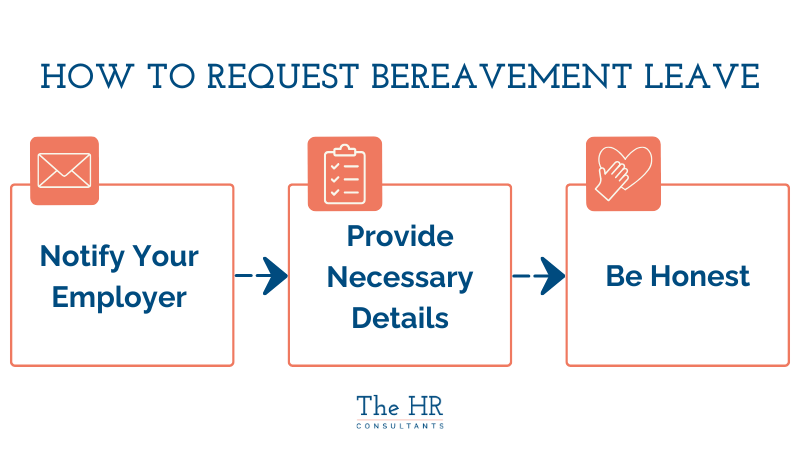"Bereavement leave normally refers to time off work in the aftermath of the death of an important person in your life. It can also be known as 'compassionate leave' when including other negative or traumatic life events.
Companies seeking to be there for employees during their hour of need should strive to handle bereavement leave carefully. The HR Consultants are on hand to help you understand exactly what bereavement leave is, the legal rights involved, and how to create a robust, yet empathetic policy.
Are Employees Legally Entitled to Bereavement Leave?
In the UK, employees are legally entitled to time off for bereavement under certain conditions, but the specifics depend on the individual circumstances. Statutory bereavement leave, often referred to as parental bereavement leave, provides essential support for employees dealing with the loss of a child or a stillbirth.
Here are the key facts:
- Parental bereavement leave: Up to two weeks’ leave for employees who have lost a child under 18 or experienced a stillbirth after 24 weeks of pregnancy.
- Eligibility: Applies to all employees, regardless of how long they’ve been with their employer.
- Other bereavements: For losses such as a spouse, parent, or dependant, there’s no statutory entitlement, but employees can take “reasonable” unpaid time off to deal with the situation.
- Workplace policies: Many employers offer paid leave and additional support, so it’s worth reviewing your company’s policy.
Providing clarity on these entitlements ensures employees feel supported when they need it most.
How Long Is Bereavement Leave?
The length of bereavement leave can vary widely depending on workplace policies and the relationship to the deceased. Here are some general guidelines:
- For a Child or Stillbirth: Up to two weeks is legally protected under parental bereavement leave.
- For Other Relationships: Employers often grant 1–5 days for immediate family members, like a spouse, parent, or sibling.
- Extended Leave: Some workplaces offer flexibility, allowing additional unpaid or paid leave depending on circumstances.
If you need more time, speak openly with your employer to explore options like more paid time using annual leave or unpaid leave.
Is Bereavement Leave Paid or Unpaid?
Whether bereavement leave is paid depends on your employer’s bereavement policy and the type of leave:
- Statutory Parental Bereavement Pay: Eligible employees may receive up to two weeks’ pay at a statutory rate, provided they meet criteria like earning above the lower earnings limit.
- Employer Policies: Many organisations offer paid leave for other bereavements, such as a child's death, death of a spouse, parent, or dependent. Check your company handbook or speak to HR to understand your options.
Having clarity about payment helps you plan during a challenging time.
How to Request Bereavement Leave
Requesting paid bereavement leave off can feel daunting when emotions are high, but employers are generally understanding. Here’s how to approach it:
- Notify Your Employer: Contact your manager or HR department as soon as possible. This could be via phone, email, or in person, depending on your company’s norms.
- Provide Necessary Details: Share who has passed away and your relationship to them. Mention the amount of time you’re requesting and whether you anticipate needing additional leave.
- Be Honest: If you’re struggling emotionally, let your employer know. They may offer additional support or flexibility.

Employers should approach these conversations with empathy and understanding, balancing operational needs with compassion.
Managing Bereavement Leave in the Workplace
From an employer’s perspective, handling bereavement leave requests requires sensitivity, empathy, and proactive planning. The way you approach this delicate situation can significantly impact an employee’s wellbeing and your workplace culture. Here are some key tips to ensure you manage bereavement leave effectively and compassionately:
Respond Compassionately: The first step is to acknowledge the loss with genuine care. A simple statement like, “I’m so sorry for your loss,” or “Please let me know how we can support you during this time,” can provide a sense of comfort. Avoid jumping straight into logistics—lead with humanity and empathy.
Have a Clear Policy: Uncertainty can add stress during an already difficult time. Ensure your employee handbook includes a clear and fair bereavement leave policy. This should outline how employees can request leave, how much time is available, whether it’s paid or unpaid, and any additional provisions. This clarity provides reassurance and demonstrates your commitment to supporting employees in times of need.
Balance Continuity and Care: It’s important to address the temporary gap in responsibilities without making the employee feel pressured. Plan ahead for coverage or delegate tasks to other team members. Communicate this plan to the team to minimise disruption while reinforcing that their colleague’s wellbeing comes first.
Offer Resources: Grief can affect people in different ways, and some may need additional support. Offering access to grief counselling, employee assistance programmes (EAPs), or wellness resources can make a big difference. Encourage employees to take advantage of these services, reinforcing that seeking help is a sign of strength, not weakness.
Foster a Culture of Understanding: Beyond policies and resources, aim to build a workplace culture that prioritises empathy and respect. Encourage open communication, provide flexibility when possible, and check in with the employee once they’ve returned to work. This approach shows that you value your team as individuals, not just employees.

Creating a thoughtful and compassionate approach to bereavement leave not only helps employees during a challenging time but also strengthens trust and loyalty within your team. When people feel supported in their darkest moments, they’re more likely to feel a deep connection to your organisation. By leading with care and understanding, you create a workplace that values people above all else.
What Is Considered Immediate Family for Bereavement Leave?
“Immediate family” typically includes:
- Spouse or partner
- Parents or guardians
- Children or dependents
- Siblings
However, some employers may extend leave to cover grandparents, in-laws, or even close friends, depending on their policy. Always refer to your company’s guidelines for specifics.
Tips for Employers on Supporting Grieving Employees
Supporting employees through bereavement doesn’t stop at granting leave. Here’s how you can foster a compassionate workplace:
- Check In: A quick message or call to see how they’re doing can mean a lot.
- Be Flexible: Grief doesn’t have a set timeline. Offering options like phased returns or remote work can ease the transition back to normal duties to deal with a flexible working request.
- Encourage Dialogue: Let employees know it’s okay to talk about their loss if they wish.
- Provide Resources: Share information about grief support services or counselling options.
These actions show that your organisation values its people, even in tough times.
Conclusion
Bereavement leave is about more than just time off; it’s about supporting individuals through one of life’s most challenging moments. Whether you’re an employee navigating your entitlements or an employer looking to foster a compassionate workplace, understanding bereavement leave policies is key.
For employers, having a clear and empathetic policy not only supports your team but also strengthens trust and loyalty. For employees, knowing your rights and the resources available can make a difficult time a little easier. Remember, no one should have to face grief alone—in or out of the workplace.
[addCTA blink=""/services/hr-advice/"" title=""Talk to us about how to best approach this sensitive area of your policy.""]
Frequently Asked Questions
We've answered some key questions about how to approach bereavement leave.
Can an employer refuse bereavement leave?
Employers cannot refuse statutory parental bereavement leave, which is protected by law to ensure parents have adequate time to grieve the loss of a child under 18 or a stillbirth after 24 weeks. For other types of bereavement, such as the loss of a spouse, parent, or close family member, employers may have discretion in granting leave. However, they are legally required to allow 'reasonable' unpaid time off to handle immediate responsibilities if the deceased was a dependent. Having a clear company policy in place can help both employees and employers navigate these difficult moments compassionately.
Does bereavement leave count as sick leave?
No, bereavement leave and sick leave serve different purposes. Bereavement leave is designated to give employees time to grieve and manage tasks related to a loved one’s death, such as attending a funeral or settling affairs. Occupational sick leave, on the other hand, is specifically for dealing with medical or health-related issues. If grief begins to affect your mental or physical health significantly, you may be eligible for occupational sick pay. A doctor’s note may be required to confirm your condition and access this type of leave. It’s always worth discussing your situation openly with your employer to explore the support options available.
What happens if I’m self-employed and need time off due to bereavement?
Self-employed individuals do not have statutory entitlements to bereavement leave, making it essential to plan ahead. If you need time off, communicate openly with clients or collaborators to adjust deadlines or project timelines. Financially, creating an emergency fund can provide the flexibility to take time off when needed. Prioritising your mental health is key. Seek emotional support through family, friends, or professional counselling. Remember, while self-employment offers independence, taking time to care for yourself is equally important to sustain your business and personal well-being."












